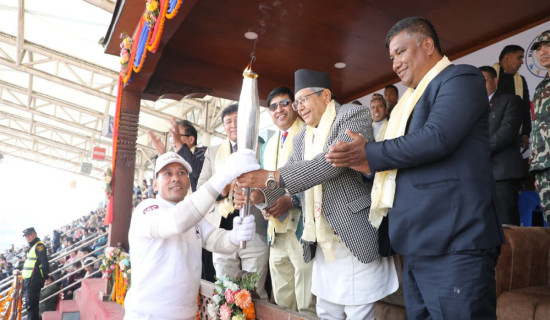- Sunday, 28 December 2025
Stability For Development
Political stability is a prerequisite for sustained economic growth, good governance and democratic order. The countries that have attained relative stability and succeeded to bury fundamental ideological differences among the major political and social forces have witnessed peace and prosperity. At one stage, every nation undergoes a phase of political tumult marked by democratic movements, revolutions, coups and frequent changes of governments. As the cycle of revolutions and counter-revolutions come to an end, the chosen political system is ultimately installed and consolidated.
However, robust public institutions must be in place in order to institutionalise the system. When the system takes root, occasional political volatility characterised by the making and breaking of governments that are either of single party or coalition of more than one party do not affect the functioning of state institutions working to deliver public goods and services to the citizens. Chronic political instability has been a main hindrance for Nepal's development and effective governance system. Since the downfall of Rana rule in 1951, no government has completed its full tenure.
A decade-long experiment of multiparty democracy saw coming and going of several governments, paving the way for the imposition of autocratic Panchayat regime in 1961. It is interesting that even the handpicked cabinets formed during the three-decade-long party-less Panchayat administration could not function for their full terms. The multiparty democracy was restored in 1990 but the parliamentary system suffered unintended glitches, with frequent dissolutions of House of Representatives (HoR). Nepal's relentless quest for stability has remained elusive even after the promulgation of the new constitution in 2015, ushering in the federal, secular and republican set-up.
The two election cycles have concluded after the country formally adopted the federal republican system. But the people's hope for stable government has been again dashed when the HoR formed following the general elections in 2017 was dissolved twice. The three-tier polls held in November 2022 produced a hung parliament, a recipe for an unstable governance. There have been shifts in political alliances in centre and provinces. Though the head of executive has been the same, the Cabinet has been reshuffled more than once due to exit of one coalition partner and entry of others in the government.
Several factors have been attributed to the continuous instability in the country. The leaders of different political parties, whom this daily talked with the other day, have stated that immaturity of the political parties, compromise in constitution writing, societal divisions in partisan line and greed for power perks and facilities have caused instability, with negative repercussions on the governance, production and job creation. There has been a tendency of using statute to fulfil the vested partisan interests instead of making it the common roadmap for development and prosperity. The elected leaders must give priority to common goals and concerns by keeping the partisan interest aside.
There is a propensity to see fault lines in the constitution but the real problems lies in the political leadership that fails to abide by its norms, values and ideals. Embracing the constitution guided political culture and ethos is essential to implement it in letter and spirit. The political parties often talk of changing the system but they always forget to transform themselves. The political parties and their leaders must adhere to basic values of democracy and strive for ensuring clean government, policy consistency, execution of vital development projects and delivery of public goods and services, which eventually promote stability and inclusive development.

















